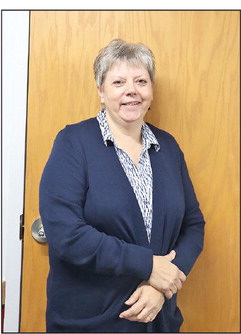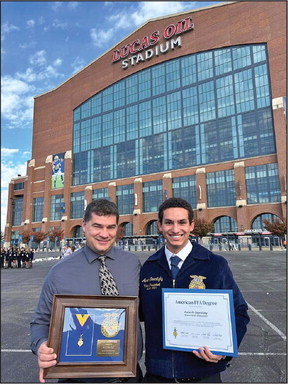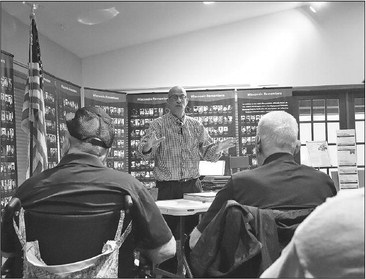Greenwood to look at costs for both new and remodeled library options
The next step for the city of Greenwood in its possible pursuit of a FEMA grant to upgrade its public library will be to get cost estimates for both a renovation/ expansion of the current library as well as construction of a new facility. It will also check further into the possible purchase of land in the city in case the decision is made to build new.
The City Council’s Facilities Committee met jointly on March 10 with the Public Library Board and its Building & Policy Committee to discuss options for a library upgrade and possible application for a Federal Emergency Management Agency (FEMA) grant that could pay a sizable portion of the cost. If the city were to build a structure that could also be used as a community storm shelter, a FEMA pre-disaster mitigation grant could fund up to 90 percent of the external structural costs.
Jordan Buss, a consultant from Spencer who is working with the city on a possible grant application, told the Council in early March that FEMA funds could be used in either a renovation/addition scenario, or for a new building project, as long as the structure would be built to certain strength standards. FEMA will fund projects for use as a tornado safe room, and a community can then use the structure for whatever purpose it chooses as long as it pays for the interior improvements.
The FEMA grant program comes at an opportune time for the city, which has been discussing library upgrade options for a few years. The current library is housed in the 1934 former City Hall building on Main Street, but it has significant space limitations and the building is in need of work.
As area school districts have been utilizing the FEMA program to bring in grants for new school buildings/community storm shelters, Greenwood inquired about its chances for also receiving funds. Buss has started a private consulting business to work on FEMA grants, and is advising the city on how it can proceed.
Buss told the Council on March 3 that based on his preliminary estimates of a population that would be served by a storm shelter, the city could qualify for a $2.1 million grant to pay for as much as 90 percent of an 11,275-square foot building. That would be the maximum size FEMA would fund, but the city can go with a smaller structure and still receive funding. The Library Board has estimated it could use a 6,000-square foot building to meet library material space and programming needs.
The current library has about 1,600 square feet of useable space, but it’s split up into smaller areas by various walls. The Library Board has noted that the space is the smallest of any of the 10 public libraries in Clark County, with the next smallest at approximately 3,000 square feet. While it has the smallest space, the Greenwood library has the fifth-highest circulation of the county’s 10 libraries. The joint committees last week talked about everything from adding a 40’X40’ addition onto the existing library building to buying a piece of land in the city for a new library. With no cost estimates yet received for any option, the committees agreed an architect should be hired to draw basic plans with estimates. Who will pay for the architectural costs was not determined. The Library Board has a fund set aside for a possible building project and says it could pay for both a land purchase and Buss’ consultant fees, but asked last week if the city could help fund the architect’s costs. The answer was no.
“We don’t have anything budgeted,” said city clerk Kayla Schar.
The city will give the library $64,500 in annual funding this year for usual operational costs. The library also draws funds from the county to help cover its costs for staffing, material purchases, etc.
The Library Board is pushing for a new construction or expansion project mainly because of space needs, but is not asking for a maximum size structure available
There is some risk in this, there’s no way around it. We do our best preparation and hope for the best.” -- Greenwood Mayor Jim Schecklman under a FEMA grant.
“That’s not practical, nor do we need that much,” said Library Board President Cheri Lenz of the 11,275-square foot building size used by Buss to calculate a potential grant estimate.
While Buss’ maximum size estimate included an estimated $540,000 local commitment for interior work, Lenz said the 6,000-square foot space envisioned by the Library Board would bring that local amount into the $300,000$350,000 range. The city’s portion could be even less if there would be public financial support for a project.
“We hope there are people out there who might be willing to get on board and give some money,” Lenz said.
City Facilities Committee member Louie Fortuna asked about the need to even go to a 6,000-square foot library.
“Does it have to be that big?” he said. “We have a thousand people in this town.”
Lenz said the 6,000-square foot figure is a “rough guess” of what would be needed to give the library enough space for materials and for a larger space for community gatherings/programming.
Library Director Kim Metzke said Greenwood’s library is well-used despite its space limitations.
The fact that Greenwood has the fifth-highest circulation in the county “tells us that we’re doing something right, although we can’t offer much more than check-outs and class visits,” Metzke said. “There are times people are lined up down the hallway to check out books.”
The library has to limit numbers for children’s programs, she added, and does not bring in speakers, authors, classes or other events due to lack of a large gathering space.
The Library Board has discussed the expansion/ renovation option, but believes a new facility would better serve patrons.
Metzke said the current library space is so partitioned by walls that it will always limit access. Users in wheelchairs sometimes move into a space, but don’t have room to turn to get back out.
“What we have now is so cut up into smaller rooms, and it’s a 1934 building,” Metzke said. “We have to think of the people who have mobility issues.”
Library Board member Joan Hoeper said the old building also has problems such as water leakage into the basement, mold on walls, etc.
“Stuff like that has to be looked at because that’s not a safe environment,” she said.
What about a location?
If the city were to decide to pursue a FEMA grant for a new library, where would it be built? The Library Board has identified a location, and the city Council has had discussions on it.
Lenz said the Library Board has spoken with St. Mary’s Catholic Church leaders who have indicated interest in selling part of the church school’s playground area, directly across West Division Street from the city garage. That would be a centrally-located spot in the city and would offer room to develop off-street parking, something the current library does not have.
The Council had listed the possible land purchase on a March 3 meeting agenda, but tabled it because city rules call for any possible property purchase to first go through the Planning Commission for a recommendation. That has not yet happened.
Lenz said the Library Board has the funds to buy the lot. After discussions on March 10, it was decided that the Library Board will ask the church for an offer to purchase, contingent upon the city deciding to apply for a FEMA grant.
Buss has told the city he needs to know of its intentions by Dec. 1 to give him time to meet the FEMA grant application deadline in January 2022.
Too big, or not big enough?
As the committee discussed options last week, various library size issues were discussed. Fortuna said a 40’X40’ addition onto the existing library would double the current space. Also, he said, an architect might be able to redesign existing space to remove walls.
He said the city should find out the costs of such a plan.
“I’m not opposed to a new building,” he said. “Is it more feasible to remodel or build new?”
Mayor Jim Schecklman said a smaller addition to an 80-plus-year-old building might not be eligible for FEMA funds.
“Is that even going to be big enough to qualify for a FEMA grant?” the mayor said.
Library Board member Jim Mildbrand said the main reason FEMA would consider Greenwood’s application is the need for a storm shelter. A safe room that would not hold enough people may not qualify.
“We want to make sure if we apply for a FEMA grant, we make it big enough to protect the citizens,” Mildbrand said.
An unknown at this time is the price tag that would accompany remodeling of an old building that has issues with accessibility for persons with disabilities, including a single restroom that is not wheelchair accessible.
“It definitely is congested,” Schecklman said. “One bathroom is definitely a challenge.”
Hoeper said the old library building has an historic charm, but is not worth a significant upgrade investment.
“I love that building, but there is so much that needs to be done,” she said. “I know for a fact that it’s easier to build new than it is to tear into something.”
Schecklman said the city owes it to taxpayers to do its “due diligence” in investigating all options. He said citizens will be more accepting of a final decision if the city can show it made the best choice.
“As much as we love the library, a lot of people don’t use it,” he said.
All three committees agreed the city needs cost comparisons among the options before it decides to apply for FEMA funds. That needs to be done relatively soon as the city has less than six months to get Buss what he needs for a possible grant application “There’s a lot of moving pieces to this and timing is going to be complicated,” Schecklman said.
He also said the city needs the best information it can get on cost estimates of the various options, and even then, it will have to make a difficult decision soon.
“We can’t do this without a risk. There is some risk in this, there’s no way around it,” the mayor said. “We do our best preparation and hope for the best.”





